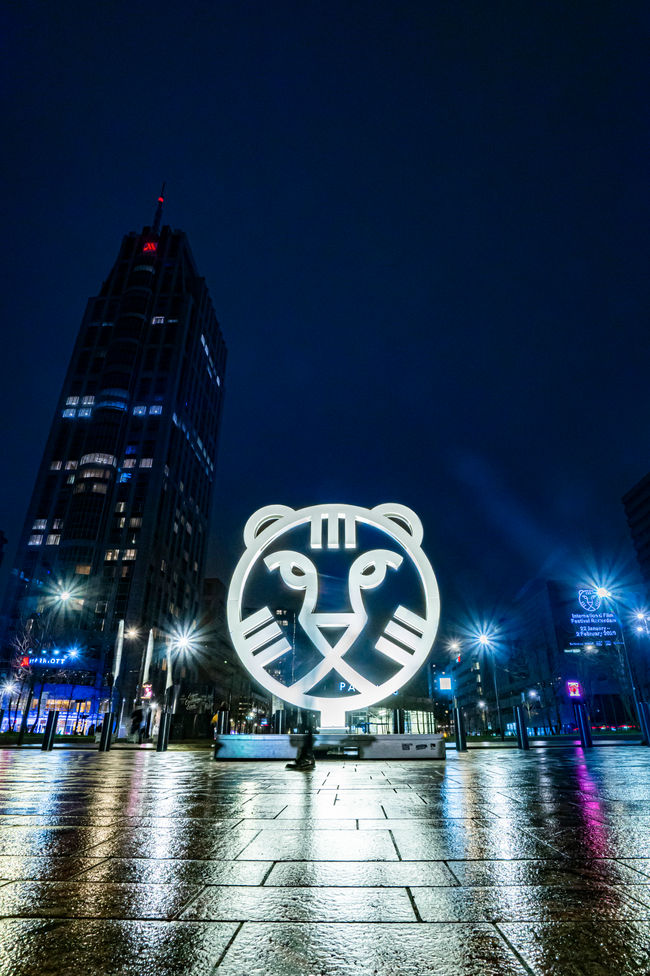Interview with Paul Felton and Joe DeNardo
29 January 2020
by Young Film Critic Beatrice Loayza
by Young Film Critic Beatrice Loayza
You mentioned before that you wrote the film around actress and performance artist Stephanie Hayes. Can you tell me more about finding her and how that sparked the broader story?
Felton: The germ of the idea was there beforehand, which was very vague, which was just having this member of the Brooklyn bohemian class coming into really close contact with this sort of unhinged representation of American geopolitics or mischief. And then I met Stephanie at a mutual friend's house and she said she was in this Richard Forman play at The Public [Theatre]. So I went to go see that because I was already a fan of [Forman’s] work.
DeNardo: This would’ve been like 2014?
Felton: Yeah, I think so. We had a drink after that and started talking, and it just started to become clear that she would be very game for the kind of film that Joe and I had been wanted to make for a couple of years. That's when I started specifically writing for her.
DeNardo: Minor sidebar, which is that I had made some short films and Paul had written one of these that I made for Eleanor Friedberger, who is also in Slow Machine. So that short kind of helped us see the possibility of her being the backdrop in Slow Machine.
Felton: And Stephanie will always say, she's playing herself, but she's also playing me as a Swedish woman. Like, she used my personality and what she knows about me, or assumes about me.
That’s interesting you say it was based off you because at the same time I feel like this is a role that very much needs to be played by a woman. In general, I think there’s a lot of blonde women like Stephanie in this movie, and I don’t know if that was intentional but it did evoke film noirs to me.
Felton: I think that we were interested in the notion that there were these sort of doubles.
DeNardo: Kind of like That Obscure Object of Desire, when you have people that are so similar and the actress changes halfway through the movie.
Felton: Hopefully it doesn't feel too fetishistic. It was also kind of a happy accident. And these are ultimately just the people that we know.
Something that really struck me was when one of the characters says there is a "sense of banal foreboding." Which to me encompasses the film in so many ways. So can you just speak more to how you made sense of these kinds of disparate elements? I think you called the film a "screwball thriller" in the programme notes?
Felton: We called it a screwball thriller before we made it, and I kind of wish that wasn't in the programme. At least now. It was a nice place to start. I think on our Kickstarter we were like: this is an Andy Warhol meets a Whit Stillman thriller, which is nonsense but sounds cool.
DeNardo: Preposterous.
Felton: Yeah, preposterous. I think I know we were both interested in a movie that had a certain durational rigor to it, as well as a lot of hopefully engaging and interesting conversations and a dynamic kind of action. A lot of our favorite movies have that quality. The inspirational grandfather for our movie is Jacques Rivette, who both of us are huge fans of. We've seen his movie set together, and we sort of discovered his movies two years ago at the French Institute [in NYC] and saw everything we could. And so I think he does this thing you describe.
There are also these elements that in another movie might get exploited in different ways. And in ours, it's sort of boring. Like, I know John le Carré is somebody else I think of a lot. His books are next to my dad's like Tom Clancy books, but when I actually read it I realised the books are just about how boring being a spy, living this wintry, sad life. So this was sort of our version of a le Carré story.
Can you talk about what it was like collaborating? It’s my understanding this is your second film together, but your first-time co-directing.
DeNardo: We’ve been friends for a super long time. I think we met on my first day of college. And we’ve been talking about this film for a long time. On set, the work is pretty divided. The technical stuff with the camera and the lighting I do, while [Paul] handles prepping the actors. He also provides more context because he’s much more aware of the theatre world in New York City. Though the work overlapped and we had a hand in each other’s business, we never intruded.
Felton: The division of labour was such that we were never talking to the same guy at the same time.









